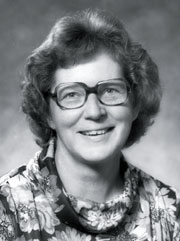
No. 57, Spring 2015
Ann Klassen Wiens: Missionary Advocate and Friend
A Mennonite missionary holding a spear with a sharp and deadly point is probably not a sight that many people would expect to see. Yet Ann Klassen, missionary to the Lengua (now called Enlhet) and Chuluppi (now Nivacle) people of the Paraguayan Chaco, is often pictured holding a Moro spear much like the one used to kill a missionary some years earlier (see Profiles of Mennonite Faith: No. 19). That spear shows only part of what made Ann such a well-loved missionary in Paraguay.

Ann Klassen Wiens (1930–1988)
Anneliese Klassen was born on November 9, 1930, to John and Gertrude Klassen in Winnipeg, Manitoba. She was the third in a family of six children. Her family farmed in Manitoba at Culross, Newton, and Poplar Point, while Ann attended the Mennonite schools in Gretna and Winnipeg. At the age of thirteen, Ann became a Christian and was later baptized in Newton, taking another step in her early commitment to becoming a missionary. Following high school, she graduated from the Winkler Bible Institute and then the Mennonite Brethren Bible College in Winnipeg. Next came nursing studies at the Grace Hospital in Winnipeg and then further education at Tabor College in Hillsboro, Kansas.
In 1960, Ann applied to work with Mennonite Brethren Missions and was accepted for service in Paraguay at Yalve Sanga, Chaco. Her task was to use her training in the area of nursing and later to serve as a social worker among the women of the indigenous tribes, jobs which she did faithfully for the next eighteen years, with the exception of a brief assignment at Bethany College in Hepburn, Saskatchewan. During that year (1971–1972), she served in various roles, including dean of women and campus nurse.
The timing of Ann’s term of service in Paraguay likely caused her family some anxiety. In 1958, just three years before Ann began her work, a missionary named Kornelius Isaak had encountered a group of Ayoreo (or Moro) tribesmen. This meeting proved to be fatal for Isaak, who received a stab wound from a Moro spear and died the next day.
Despite the danger, the missionaries still tried to make contact with the Ayoreo people. One day, Ann joined a group setting out with gifts to give the Ayoreo. As the missionaries approached a group of Ayoreo tribesmen, Ann’s group began offering candy and other gifts. When one of the Ayoreo leaders noticed Ann’s necklace, he indicated that he wanted it. Ann managed to convey the idea that she would give him the necklace, but only in exchange for the spear that he was carrying. He agreed, and Ann gave up her pearls to obtain a spear much like the one that had killed Kornelius Isaak only a few years before.
This encounter was probably one of the most dramatic events in Ann Klassen’s missionary career. She took the spear back to Canada with her and often used it to illustrate her stories about South America. That spear is now at the Centre for Mennonite Brethren Studies in Winnipeg. Those who remember her life in Paraguay, however, say she was known especially for her deep connection to the people she was serving. Ann loved to laugh, a characteristic that endeared her to the indigenous peoples, as well as the Mennonite settlers.
She became friends with many of the local people, remembering them throughout her life and distributing most of her belongings to them before she died. She had a strong concern for the indigenous women of the region, and she was an advocate for projects that helped the whole family. Throughout her time in Paraguay, Ann exhibited an open and joyful spirit that the people around her found compelling.
Besides her friendliness, Ann was known for her bravery and determination. One Christmas when she was left alone at the mission station, she rode thirty-seven kilometers on her bicycle to go visit some missionaries. She drove cars and trucks when they were available, which few women in the Chaco did at the time, and even fixed potholes. When she wanted to bring electricity to Yalve Sanga, she helped to raise the money herself. Whenever something needed to be done, she did it.
On September 28, 1979, Ann Klassen entered a new era of her life in Paraguay when she married Peter Wiens, a minister from the Filadelfia Colony in the Chaco. During her life as Ann Wiens, she served as the director of nursing in the Filadelfia hospital and later set up the town’s first nursing home. Peter was a widower with six children, and Ann took on the task of being a mother to them. Even after the children grew up and left home, she would frequently invite them over for meals and help them in many ways. She also expressed concern for her nephews and nieces, saying, at the end of her life, “Tell them to be Christians.”
At the beginning of May 1988, Ann began to experience health problems, including a bad cough, headaches, and fatigue. On consulting doctors in Asuncion, she received a diagnosis of cancer in her lungs and a tumor in her brain. She died of her illness on June 23, 1988, and was buried under a bottle tree in Yalve Sanga, the community where she had served for so many years. The funeral took place on June 25 in the Filadelfia Mennonite Church, with a memorial service on July 3 at the Community Fellowship Church in Newton.
Ann’s life was characterized by dedication, friendliness, and advocacy. Long after her death, the people of Yalve Sanga still remembered the worker who had lived and laughed with them. Her desire was that “my life have real meaning; I find that as I know and grow in the knowledge of Jesus Christ, and God the Father, there is joy and purpose to life.”
